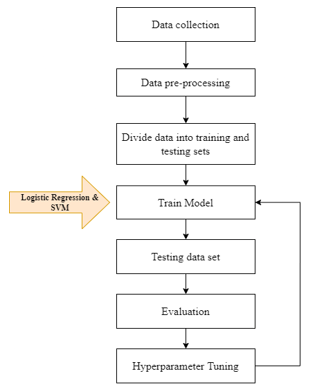Comparative Study of Heart Failure Prediction Algorithm: Logistic Regression and SVM
Keywords:
Machine Learning, Heart Disease, Support Vector Machine, Logistic RegressionAbstract
Heart and blood vessel function is the biggest causes of death globally. Some researchers used machine learning approaches to predict it earlier and effective. There is a various machine learning to predict heart disease including Logistic Regression and Support Vector Machine. Many researchers using some of dataset, the dataset used is a dataset of heart disease patients obtained from the UCI Machine Learning Repository. This study comparing the performance of Logistic Regression and Support Victor Machine to predict it. Finally, the results Logistic Regression and SVM has average same performance, the AUC Support Vector Machine value is around 93.58% and Logistic Regression is around 92.95%, the SVM value is 0.63% higher than Logistic Regression.
Downloads
References
World Health Organization, "Cardiovascular disaeses," World Health Organizataion, [Online]. Available: https://www.who.int/health-topics/cardiovascular-diseases. [Accessed 26 4 2022].
IBM Cloud Education, "Machine Learning," IBM, 15 July 2020. [Online]. Available: https://www.ibm.com/cloud/learn/machine-learning. [Accessed 26 4 2022].
Fedesoriano, "Heart Failure Prediction Dataset," Kaggle, September 2021. [Online]. Available: https://www.kaggle.com/datasets/fedesoriano/heart-failure-prediction. [Accessed 26 4 2022].
M. Gupta and S. D. Pandya, "A Comparative Study on Supervised Machine Learning Algorithm," Internatonal Journal for Research in Applied Science & Engineering Technology (IJRASET), vol. 10, no. 1, pp. 1023-1028, 2022.
G. S. Nayak, S. P. Patro and N. Padhy, "Heart disease prediction by using novel optimization algorithm: A supervised learning prospective," Informatics in Medicine Unlocked, vol. 26, pp. 2-4, 2021.
C. Xiao, Y. Li and Y. Jiang, "Heart Coronary Artery Segmentation and Disease Risk Warning Based on a Deep Learning Algorithm," IEEE Access, pp. 1-1, 2020.
L. Marleni and A. Alhabib, "Faktor Risiko Penyakit Jantung Koroner," Jurnal Kesehatan Politeknik Kesehatan Kementrian Kesehatan Tanjung Karang, vol. 8, no. 3, pp. 478-483, 2017.
H. Jindal, S. Agrawal, R. Khera, R. Jain and P. Nagrath, "Heart disease prediction using machine learning algorithms," IOP Conference Series: Materials Science and Engineering, pp. 1-10, 2021.
M. G. C. Leiro, "Advanced heart failure: a position statement of the Heart Failure Association of the European Society of Cardiology," European Journal of Heart Failure, vol. 20, no. 11, pp. 1505-1535, 2018.
F. Z. Abdeldjouad, B. Menaouer and M. Nada, "A Hybrid Approach for Heart Disease Diagnosis and Prediction Using Machine Learning Techniques," ICOST 2020: The Impact of Digital Technologies on Public Health in Developed and Developing Countries, pp. 299-306, 2020.
B. S. F. Astuti, N. A. Firdausanti and S. W. Purnami, "Model Evaluation for Logistic Regression and Support Vector Machines in Diabetes Problem," INFERENSI, vol. 1, no. 2, pp. 77-82, 2018.
R. Bharti, A. Khamparia, M. Shabaz, G. Dhiman, S. Pande and P. Singh, "Prediction of Heart Disease Using a Combination of Machine Learning and Deep Learning," Computational Intelligence and Neuroscience, vol. 2021, pp. 1-11, 2021.
S. Mehrolia, S. Alagarsamy and V. M. Solaikutty, "Customers response to online food delivery services during COVID-19 outbreak using binary logistic regression," International Journal of Consumer Studies, vol. 45, no. 3, pp. 396-408, 2020.
S. Huang, N. Cai, P. P. Pacheco, S. Narrandes, Y. Wang and W. Xu, "Applications of Support Vector Machine (SVM) Learning in Cancer Genomics," Cancer Genomics & Proteomics, vol. 15, no. 1, pp. 41-51, 2018.
E. F. U. Latifah, "PERBANDINGAN KINERJA MACHINE LEARNING BERBASIS ALGORITMA SUPPORT VECTOR MACHINE DAN NAIVE BAYES," Universitas Indonesia, 2018.
M. Z. Younas, "Effective Heart Disease Prediction using Machine Learning and Data Mining Techniques," INTERNATIONAL RESEARCH JOURNAL OF ENGINEERING AND TECHNOLOGY (IRJET), vol. 8, no. 4, pp. 3539-3546, 2021.
T. Ciu and R. Oetama, "Logistic Regression Prediction Model for Cardiovascular Disease," International Journal of New Media Technology, vol. 7, no. 1, pp. 33-38, 2020.
R. Prasad, P. Anjali, S. Adil and N. Deepa, "Heart Disease Prediction using Logistic Regression Algorithm using Machine Learning," International Journal of Engineering and Advanced Technology (IJEAT), vol. 8, no. 3, pp. 659-662, 2019.
Y. Sandhya, "Prediction of Heart Diseases using Support Vector Machine," International Journal for Research in Applied Science & Engineering Technology (IJRASET), vol. VIII, no. 2, 2020.
F. Rahman and A. M. Mahmood, "A Comprehensive Analysis of Most Relevant Features Causes Heart Disease Using Machine Learning Algorithms," 2022.
M. Shahi and E. R. K. Gurn, "Heart Disease Prediction System Using Data Mining Techniques," Oriental Journal of Computer Science and Technology, vol. 6, no. 4, 2013.
Microsoft, "Microsoft technical documentation - training and testing datasets," Microsoft, 2 April 2022. [Online]. Available: https://docs.microsoft.com/en-us/analysis-services/data-mining/training-and-testing-data-sets. [Accessed 26 May 2022].
S. HP, "Logistic regression in Statistics and Machine learning," Medium, 23 July 2019. [Online]. Available: https://medium.com/mlearning-ai/logistic-regression-60694a973bee. [Accessed 26 May 2022].
IBM, "How SVM Works," IBM, 17 August 2021. [Online]. Available: https://www.ibm.com/docs/it/spss-modeler/SaaS?topic=models-how-svm-works. [Accessed 26 May 2022].
Z. Rustam, D. A. Utami, R. Hidayat, J. Pandelaki and W. A. Nugroho, "Hybrid Preprocessing Method for Support Vector Machine for Classification of Imbalanced Cerebral Infraction Datasets," International Journal on Advanced Science Engineering Information Technology, vol. 9, no. 2, pp. 685-691, 2019.
Pusat Data dan Informasi Kementrian Kesehatan RI, "Situasi Kesehatan Jantung," Kementrian Kesehatan Republik Indonesia, 2014.

Downloads
Published
How to Cite
Issue
Section
License

This work is licensed under a Creative Commons Attribution-ShareAlike 4.0 International License.
All papers should be submitted electronically. All submitted manuscripts must be original work that is not under submission at another journal or under consideration for publication in another form, such as a monograph or chapter of a book. Authors of submitted papers are obligated not to submit their paper for publication elsewhere until an editorial decision is rendered on their submission. Further, authors of accepted papers are prohibited from publishing the results in other publications that appear before the paper is published in the Journal unless they receive approval for doing so from the Editor-In-Chief.
IJISAE open access articles are licensed under a Creative Commons Attribution-ShareAlike 4.0 International License. This license lets the audience to give appropriate credit, provide a link to the license, and indicate if changes were made and if they remix, transform, or build upon the material, they must distribute contributions under the same license as the original.





